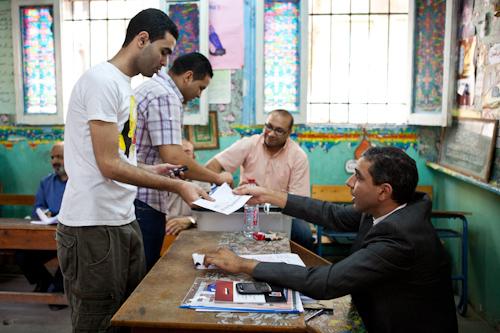 Egyptians are voting today for the first president after the 25 January uprising. More than 50 million citizens across Egypt’s 27 governorates are eligible to vote, choosing from 11 candidates. The contest is considered wide open. Egypt Independent will be bringing you live updates throughout the day.
Egyptians are voting today for the first president after the 25 January uprising. More than 50 million citizens across Egypt’s 27 governorates are eligible to vote, choosing from 11 candidates. The contest is considered wide open. Egypt Independent will be bringing you live updates throughout the day.
4:30pm: A supervising judge at the polling station in Sakhr Eddin Khaled School in Daqahliya Governorate has decided to suspend polls for four hours after discovering 35 ballots marked in advance for the favor of Muslim Brotherhood candidate Mohamed Morsy, Al-Masry Al-Youm reported.
The judge filed a report on the incident and faxed it to the Presidential Elections Commission (PEC) to rule on. Morsy’s delegates tried to convince the judge that the ballots discovered were a result of a misprint, according to Al-Masry Al-Youm.
Meanwhile, PEC chairman Farouq Sultan has said in a press conference that the commission would not hesitate to adopt legal measures against violators.
"The commission has noticed the continuation of breaches by candidates and their backers, with some violating the campaign silence period and others trying to influence voters", he said.
Sultan noted that the commission had been decisive in that respect and already referred three violations to the Public Prosecutor, and illustrated that those breaches included press conferences made by Ahmed Shafiq, Mohamed Morsy, and Abdel Moneim Abouel Fotouh, which the commission considers a form of campaigning.
3:30 pm: Throughout the country, former Mubarak regime member Ahmed Shafiq remains the candidate of choice for those with security concerns, particularly among the Christian minority.
Ivon Moros, 70, a Copt and former Central Bank general manager, cast her ballot for Shafiq at the Talaat Harb School on Mohamed Basiouny Street downtown.
"Through his words we felt that he is close to us," she says.
Her daughter Nevine, 39, a former secretary at Orascom, is also a Shafiq supporter.
"Ahmed Shafiq is decisive, his lines are clear," she says. "Shafiq respects the church and he's against religion entering politics, which for us is important — unlike Moussa, who I don't see as being decisive enough. In fact, I really wanted [Mohamed] ElBaradei, in 2009."
At Abu Qurqas in Minya, a hot spot for sectarian violence, many Christians decided that Shafiq is the best choice to ensure their security.
"Now we put our hope in God and Ahmed Shafiq," says one Christian woman who declined to give her name. "He's a known and fair person and this is what people care about regardless of religion."
According to a group of campaigners for all the main candidates, gathered together outside the polling station, the Christian community in Abu Qurqas is almost unanimously voting for Shafiq, with a smaller percentage to former Arab League chief Amr Moussa and Nasserist candidate Hamdeen Sabbahi.
"The spirit of the revolution hasn't reached this place, and the people here are sick of the Muslim Brotherhood," says Islam Abu Bakr, a campaigner for former Muslim Brotherhood member Abdel Moneim Abouel Fotouh, explaining why his candidate has so small a following in the area.
Khalil Ibrahim, an Education Ministry employee, also says he voted for Shafiq.
"I chose based on Egypt's interest, we want someone who will treat people right and who is a statesman. After the officials did all of this, now it's up to the people to make the right choice," he says.
While standing in a men's line for a poll in Abbasseya, the location of violent clashes in recent months, some voters say their main concern is a candidate's ability to maintain security, not his ties to the old regime.
“As Abbasseya people, one of the things we need is security and calm,” physician Nader Habib says. “I can’t say who I am voting for, but I will say that I am against stereotyping people as ‘feloul’ [regime remnants] just because they were involved in the last government. Everyone was involved in the last government. We should look at what people can do and what they do. If they don’t deliver in a couple of years we will have the ability to get rid of them.”
Meanwhile, state television reports that according to the health minister 13 voters, judges and security personnel have suffered from dehydration or other injuries related to crowding. No deaths related to election violence have so far been reported.
Ahmed al-Ansary, the deputy head of the Egyptian Ambulance Authority, says Judge Ahmed Shehata in Sharqiya fractured his foot.



